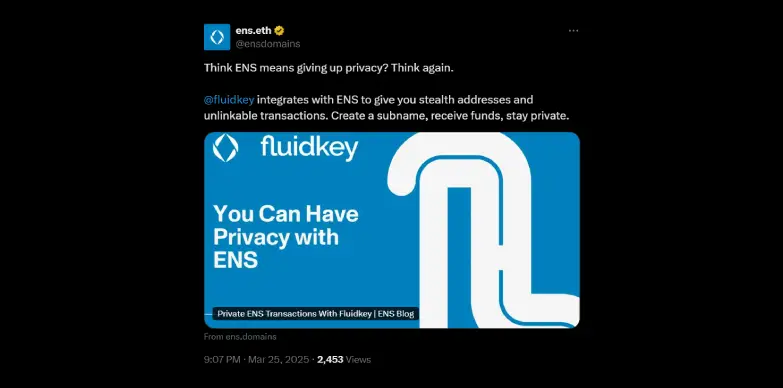Fluidkey, a privacy-focused project, is tackling one of the most discussed about concerns about transaction transparency on Ethereum Virtual Machines (EVM) chains. By integrating Ethereum Name Service (ENS) domains with stealth addresses, Fluidkey enables users to maintain financial privacy without compromising functionality or traceability.

How Fluidkey Works
Basically, the blockchain transactions are tied to the public addresses, making them very easily traceable. Fluidkey solves this by automatically generating unique stealth addresses for every transaction. These addresses are linked to a user’s ENS name but remain unlinkable to external observers.
Unlike mixers, the project ensures that the transaction traceability for compliance purposes, such as tax reporting, while breaking the linkability of payments.
Key Features
Stealth Addresses: Each incoming payment creates a smart account, which ensures privacy.
Centralized Dashboard: Users manage all transactions under a single ENS subname for convenience.
Self-Custodial: Full control of funds remains with users through the private keys.
Offchain Resolver: Reduced fees and processing times when enhancing privacy feature.
Benefits
Fluidkey eliminates the need for manually managing multiple wallets and avoids pooling funds with others, reducing risks of mixing legitimate and illegal funds. It also supports DNS records, allowing users to share browser links for payments.
Future Prospects
Currently this feature has been made available on Optimism, the project plans to expand to Ethereum Mainnet, Arbitrum, Polygon, Base, and Gnosis Chain. Its innovative approach positions it as a key player in shaping privacy standards in decentralized ecosystems.
The project’s seamless integration of privacy and usability marks a significant enhancement in the blockchain technology, offering its users increased control over their digital identities and financial transactions.
Also Read: Bitwise Adds Fold Holdings and Bitdeer to Bitcoin Index


